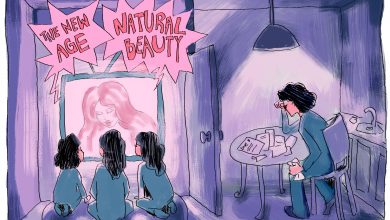The U.S.’s New Wave of Transphobia

Design by Hailey Lynaugh
In addition to popping champagne and throwing confetti, the U.S. rang in the new decade with a brand new set of vicious anti-trans bills.
While some may view the U.S. as one of the most ‘progressive’ nations, the history of this country is flooded with both explicit and implicit forms of discrimination against all members of the LGBTQIA+ community. Throughout the 20th century, the LGBTQIA+ community was disenfranchised by sodomy laws, the utter disregard of the HIV epidemic, and the lack of prosecution of hate crimes.
Although the U.S. has recently seen a progression towards pseudo-equality in regard to the treatment of the LGBTQIA+ community, including the relatively recent legalization of gay marriage in 2015 and the implementation of non-discrimination protections in a number of states, the U.S. still has a long way to go in order to achieve freedom of gender and sexual expression without fear of persecution.
As of late, politicians feel more empowered to use their platforms to advance their homophobic and transphobic agendas. In 2020 alone, at least 25 anti-trans bills have been proposed by mostly Republican lawmakers. Chase Strangio, deputy director of the ACLU’s LGBTQIA+ and HIV Project, called this one of the “most hostile” legislative seasons against the LGBTQIA+ community.
A number of these bills attempt to regulate the athletic lives of transgender teenagers. Republicans in Alabama and Tennessee proposed bills that would prevent schools from taking part in athletic events where trans athletes are permitted to play amongst those of the same gender. Such bills would override individual state athletic association policies.
These bills inherently categorize trans teenagers as the “Other,” and strive to exclude them from everyday activities that would allow them to interact with their peers. Should bans of this nature take effect, trans students would be prohibited from playing amongst others who are of the same gender; additionally, they may feel extremely uncomfortable playing amongst those who are not. As a result, they would be hindered from playing on either team, because athletic teams are generally split between boys and girls, which in and of itself is problematic and enforces the gender binary.
In Arizona, Republicans have proposed a bill that would require teachers to address students by pronouns associated with their sex assigned at birth as opposed to their gender. This bill would also make it illegal to fire public school employees because they refused to address students by their correct pronouns.
Essentially, this bill invalidates the gender identity of trans students and creates an unwelcoming, intimidating atmosphere in which they are not valued to the same degree as their cisgender peers. Teachers refusing to address students by their correct pronouns would imply to trans students that they are not worthy of the same respect as cisgender students.
While trans communities are the main target of these bills, propositions have also been made to punish those who assist minors in their transition.
According to the New York Times, South Dakota State Representative Fred Deutsch recently sponsored a bill that would make it a felony for medical professionals to provide healthcare to trans minors. As a result, this would prevent doctors from providing puberty blockers. The Human Rights Campaign reports that the bill “allows the state to arrest and imprison doctors providing care for trans and gender non-conforming youth.”
Deutsch, who has outrageously compared trans surgeries to Nazi experiments, has formed his opinions based on a Reddit thread created by detransitioners, individuals who reversed their gender transition. He became extremely concerned for the few who decided transitioning was not the right decision for them and ultimately ignored the millions of teenagers who need trans health care to reaffirm their identities.
Although this bill does not propose a complete ban on trans health care and only applies to minors, an individual’s teenage years are a pivotal point in their lifetime. Denying a teenager the methods needed for them to properly transition is detrimental to their psychological and emotional growth, and forces them to live in a body that does not truly feel like their own.
Additionally, withholding trans health care until an individual is ‘old enough’ to receive such treatment implies that gender identity is an issue of maturity and that teenagers who wish to transition may simply be ‘unsure’ of their feelings in regard to their gender. If one’s gender identity cannot be truly understood until a certain age, why do we not question minors who identify with their sex assigned at birth?
Deutsch claims the bill takes into consideration the well-being of minors by “hitting the pause button” on a life-changing decision. However, puberty blockers do not prompt any health consequences and can be stopped at any time. Additionally, denying minors the resources required for them to transition would only worsen their quality of life. The psychological consequences of the ban on trans health care for minors would be catastrophic, leading to the deterioration of mental health in trans teens, resulting in an increase of suicide rates in the trans community. According to statistics provided by the Trevor Project, “in 2019, 54% of trans youth surveyed by the organization reported ‘seriously considering suicide.’” Additionally, the Trevor Project also reports that access to puberty blockers “significantly lower suicidal ideation compared to those who did not receive such treatment.”
The influx of vicious anti-trans bills appear to simply target the quality of life of trans teenagers, all while operating under the façade of, as stated by Deutsch, “needing to protect our children.” Since when did protection include violating the privacy of teenagers and giving all power over their autonomy to the government?
A number of the bills mentioned above have already failed to pass in the House of Representatives. Nonetheless, the event of them being written as legislative propositions is enough to recognize that the U.S. is not a nation of acceptance, inclusivity or progression; it never has been. Whether or not it can become the forward-thinking nation it claims to be relies on our success in dismantling the cisnormative, heteronormative structure of our current society.




